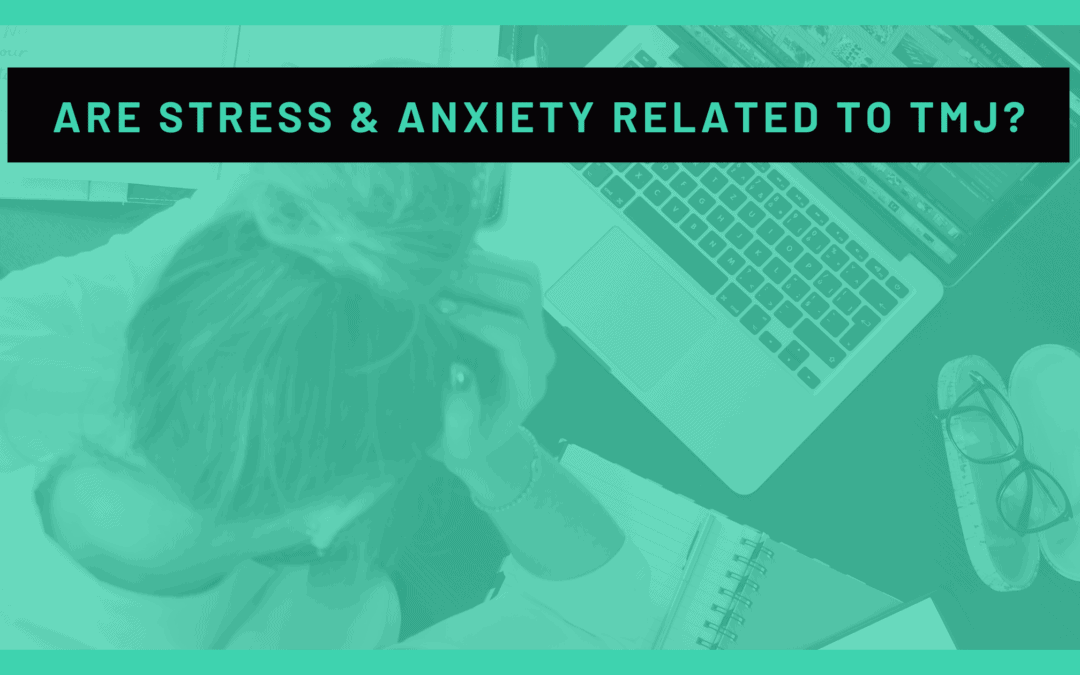We all experience stress and anxiety and are familiar with how it affects the body. But stress and anxiety can impact health in a variety of ways that are not always obvious. In addition to affecting sleep, wellness, energy, mood, stress and anxiety also affects the neuromuscular system. This system includes the jaw muscles and joints which can contribute to disorders like TMJ. It is important to be aware of the ways in which stress and anxiety affect TMJ. Fortunately, there are useful ways you can manage stress and TMJ symptoms that prevent invasive methods like surgery.
What is TMJ?
Temporomandibular joint disorder, commonly known as TMJ or TMD, refers to the inflammation (or injury) of the jaw muscles, nerves, and cartilage that surround the temporomandibular joint. The temporomandibular joints (one of each side of the face) act as hinges, connecting the jawbone to the skull and when the jaw joints are effects, it can produce the following symptoms:
- Pain, aching, tenderness of jaw and/or ears
- Difficulty (or pain) chewing
- Facial pain, tenderness, aches
- Jaw joints locking which makes it harder for your mouth to open and close
Though it can be difficult to identify exact causes of TMJ, there are factors that can contribute to its development or exacerbate symptoms including: stress and anxiety.
Link Between Stress, Anxiety, & TMJ
Stress and anxiety are common experiences and ways we respond or navigate situations. But chronically experiencing stress and anxiety can impact health in numerous ways. One way is by contributing to TMJ. Stress and anxiety can:
- Cause people to grind their teeth
- Increases facial and muscular tension
- Clench the jaw
These effects of stress and anxiety not only aggravate TMJ symptoms but can contribute to its development. The grinding of teeth can cause misalignment of the jaw and puts pressure on the joints which can cause TMJ. Additionally, stress and anxiety often take a toll on sleep which in turn worsens symptoms. This unsustainable cycle can be broken by practicing measures that include identifying and reducing stressors.
Tips for Alleviating TMJ
TMJ symptoms can typically be alleviated nonsurgical, through self-managed care that incorporates mindful practices including:
- Relax Jaw Muscles: jaw pain is the most common indication of TMJ. Relaxation of the jaw is a key way that repositions the jaw muscles and creates proper alignment. There are different ways to help relax jaw muscles including the daily use of a mouth guard.
- Massage and Stretches: massaging and stretching the jaw and neck muscles are useful ways to alleviate pain and help with relaxation. There are various techniques you can practice on a daily basis. Researching TMJ exercises can help you identify the strategies that work best for you!
- Reduce Stress & Anxiety: we all experience stress but if you experience stress chronically, it is incredibly important to identify your stressors and ways to eliminate or reduce them. Additionally, there are helpful ways to move through stress that prevent things like the clenching and tightening of muscles. A few tips include:
- breathing exercises which help calm the mind and body
- relaxing activities like yoga, meditation, drawing etc.
- exercising and/or taking walks
- Better Sleep: getting quality sleep is a key way to reduce stress and alleviate symptoms. This can be challenging because sleep is often impacted which worsens symptoms, creating a cycle that takes a toll on health! There are several useful ways you can improve sleep:
- develop a relaxing night routine – warm shower, essential oils, candles etc. – that helps wind you down and creates a calm setting
- make sure your bedding is comfortable (bed, pillows, sheets etc.)
- adjust lighting to suit your preferences
- avoid screes at least 30 minutes prior to going to bed
- use ambient noise if that is relaxing for you
Studies have shown that TMJ can be effectively treated through noninvasive measures. By incorporating measures grounded in relaxation in your daily life, you can reduce stress and anxiety in addition to enhancing sleep. These approaches can alleviate symptoms and prevent TMJ from developing into a chronic disorder. They also improve quality of life and overall health + wellness!

